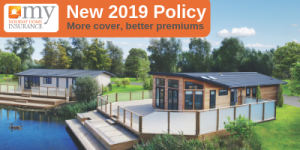NEW! Home Emergency Cover for Leisure Home Owners
My Holiday Home Insurance now offer home emergency cover for leisure home owners.
My Holiday Home Insurance now offer home emergency cover for leisure home owners.
When you are buying a static caravan there are some things you need to consider. We have put together some helpful information, general tips and suggestions that could assist you.
If you are a static caravan owner, now is the time to prepare your caravan for winter.
We are delighted to announce that My Holiday Home Insurance are winners of a UK Broker Award.
We are delighted to announce that My Holiday Home Insurance have been shortlisted for a prestigious UK Broker Award.
We want to update you on My Holiday Home Insurance’s response to the global pandemic that is causing huge upheaval to the lives of all our policyholders, as it is for people throughout the world.
This month, My Holiday Home Insurance won the 2020 Feefo Gold Trusted Service Award, an independent seal of excellence that recognises businesses for delivering exceptional experiences, as rated by real customers.
 Your leisure home insurance policy is designed to protect you against risks of things happening suddenly which you could not have expected such as fire, theft, accidental damage, flood and storm. In the winter months your leisure home can be very vulnerable, especially if it is not being used and can be damaged by the cold. There are certain things you need to remember when closing down your leisure home for the winter to prevent things such as escape of water.
Your leisure home insurance policy is designed to protect you against risks of things happening suddenly which you could not have expected such as fire, theft, accidental damage, flood and storm. In the winter months your leisure home can be very vulnerable, especially if it is not being used and can be damaged by the cold. There are certain things you need to remember when closing down your leisure home for the winter to prevent things such as escape of water.
The cover you are provided for escape of water is designed to provide cover for damage to your property caused by water leaks. One of the largest risks of water occurs when you are away during the winter months when pipes can freeze and burst, causing significant damage to your leisure home.
Important things to remember
Between 1st November and 31st March both days inclusive, if your leisure home is left without an occupant for more than 48 hours you must drain down the entire water system as a precaution to prevent freezing and any potential damage this may occur. If your leisure home has a sealed heating system containing antifreeze then this does not need to be drained down but antifreeze levels checked annually and particularly prior to the period of unoccupancy. In addition, all water tanks must be emptied by leaving both hot and cold taps fully open with plugs removed throughout the leisure home.
Or
If you wish to leave the water supply turned on between 1st November and 31st March both days inclusive, you must ensure:
Or
These things are very important and failing to comply with the requirements will result in loss or damage resulting from escape of water or burst pipes being excluded from your insurance.
It’s important that you read your insurance policy in full, along with the policy schedule to ensure that you are fully aware of the extent of the insurance cover, as well as the terms and conditions which are applied to your cover.
For similar topics like this or for general leisure home insurance information, please follow us on Twitter, Facebook & LinkedIn. You can also have a look through our website for more information.

Park Home Search – A New Way to Search for your Leisure Home
Park Home Search is a free online service that connects both buyers and sellers of leisure homes throughout the UK and it’s completely free of charge to use. There are no costs to either a buyer or a seller and it’s the perfect place to find your new dream leisure home.
Whether you are looking for a leisure home in the North, West. East or the South of England searching for your new leisure home just got easier. Park Home Search is the place to look if you are looking to find your new dream leisure home as there are hundreds of leisure homes for sale and you can browse 24 hours a day at your own convenience. If you are not able to find the leisure home you are looking for, you can register to receive information about new leisure homes for sale in some beautiful locations in the country, as and when they become available.
Manufacturers and park operators add their new leisure homes available on Park Home Search. This is free for both manufacturers and park operators which encourages them to list as many homes as they have, as soon as they are available. Buyers can search the website for their preferred leisure home according to their preferences and this can be filtered down to the location, type of home and whether they want to rent or buy the home.
If you prefer, you can register your details with Park Home Search and your information will be passed on to the relevant park operators. The park operators will contact you when new homes become available in your chosen location and all information is GDPR compliant, so your data is secure.
Manufacturers can list as many leisure homes as they want, it’s completely free and park operators can advertise any plots they have available at no cost too. Open days and weekends are also advertised on park home search by manufacturers and operators, with the option to upload photos, brochures and videos about the leisure homes. The manufacturers and park operators have complete control of their own information as they are able to list, amend, remove and update homes all using one easy form online. There is the great added feature where sellers of the homes receive email leads from potential buyers interested in their homes providing sellers with complete control.
With the above features and much more available to both buyers and seller of leisure homes, there are so many reasons to use Park Home Search. So many are already taking advantage of this free service, so why don’t you!
For further information visit www.parkhomesearch.co.uk.
For similar topics like this or for general leisure home insurance information, please follow us on Twitter, Facebook & LinkedIn.
 Exclusively to My Holiday Home Insurance and new for 2019, we have enhanced our insurance policy to bring you better cover and even better value for money.
Exclusively to My Holiday Home Insurance and new for 2019, we have enhanced our insurance policy to bring you better cover and even better value for money.
We always listen to our customers and review our insurance policy on a regular basis to ensure we are meeting the needs of leisure home owners. With this in mind, we now bring you one of the most competitive and enhanced cover on the market with our new 2019 Leisure Home policy.
As specialists in the insurance sector and with over 13 years’ experience, we have tailored our insurance policy to meet the needs of our customers who own a static caravan, holiday lodge or leisure home in the UK. With our new leisure insurance policy, you receive our highest ever level of cover, along with numerous choices of optional extra cover. The optional extras we provide can be added to your standard cover to protect items such as decking, hot tubs, pedal cycles and sports equipment, just to name a few. Our new leisure home insurance policy cannot be found anywhere else and offer you advisory cover to suit your individual needs, which means you only need to pay for the cover you require.
Outlined below is just some of the cover you can receive with our new 2019 insurance policy.
For more information about our cover, please click on the relevant link below:
Alternatively, you can call 0800 988 0890 and speak to one of our specialist advisors. To keep up to date with information about static caravans, holiday lodges and leisure homes, please follow us on Twitter, Facebook & LinkedIn.
My Holiday Home Insurance
Assist Insurance Services Ltd
Royal House,
Queenswood,
Newport Pagnell Road West,
Northampton NN4 7JJ
EXISTING CUSTOMERS
01604 946 787
CUSTOMER RENEWALS
01604 946 682
CUSTOMER CLAIMS
0344 856 2187
We value your privacy
We use cookies to improve your experience of this website by remembering your usage preferences, collecting statistics, and targeting relevant content. If you continue to use this site we’ll assume you’re happy to receive all cookies.
We may request cookies to be set on your device. We use cookies to let us know when you visit our websites, how you interact with us, to enrich your user experience, and to customize your relationship with our website.
Click on the different category headings to find out more. You can also change some of your preferences. Note that blocking some types of cookies may impact your experience on our websites and the services we are able to offer.
These cookies are strictly necessary to provide you with services available through our website and to use some of its features.
Because these cookies are strictly necessary to deliver the website, refusing them will have impact how our site functions. You always can block or delete cookies by changing your browser settings and force blocking all cookies on this website. But this will always prompt you to accept/refuse cookies when revisiting our site.
We fully respect if you want to refuse cookies but to avoid asking you again and again kindly allow us to store a cookie for that. You are free to opt out any time or opt in for other cookies to get a better experience. If you refuse cookies we will remove all set cookies in our domain.
We provide you with a list of stored cookies on your computer in our domain so you can check what we stored. Due to security reasons we are not able to show or modify cookies from other domains. You can check these in your browser security settings.
We also use different external services like Google Webfonts, Google Maps, and external Video providers. Since these providers may collect personal data like your IP address we allow you to block them here. Please be aware that this might heavily reduce the functionality and appearance of our site. Changes will take effect once you reload the page.
Google Webfont Settings:
Google Map Settings:
Google reCaptcha Settings:
Vimeo and Youtube video embeds:
You can read about our cookies and privacy settings in detail on our Privacy Policy Page.
Privacy PolicyBuildings Sum Insured (Rebuild Costs)
Please enter the rebuild cost of your property. This must include the cost of debris removal, architects, surveyors, consultants, legal fees, taxation and the additional cost of complying with any government or local authority requirements. (The is not the figure that is provided by some insurers which is £500,000 or £1million, these are blanket sums insureds and is the maximum level that insurer will pay in the event of a total loss, and it also is not the market value of your property).
ABI rebuilding cost calculator
If your UK holiday home is of standard construction the Association of British Insurers (ABI) offers a free (registration required) rebuild cost calculator to assist you assess the rebuilding cost of your property. To use the calculator and obtain an approximate rebuild cost, you’ll need to measure the external floor area of both downstairs and upstairs of your property.
Click here to go to the ABI rebuilding Cost Calculator https://abi.bcis.co.uk/
IMPORTANT INFORMATION: Please be advised that the ABI rebuilding Cost Calculator will only provide an indicative figure for rebuild costs as there are a number of restrictions to the calculator such as, properties with unusual features, thatched buildings, listed buildings or houses made of non-standard materials. Declaring the correct sums to insure your property for, will remain the responsibility of the policyholder at all times.
Contents Sum Insured
WE NEED SOME TEXT TO INCLUDE HERE…
